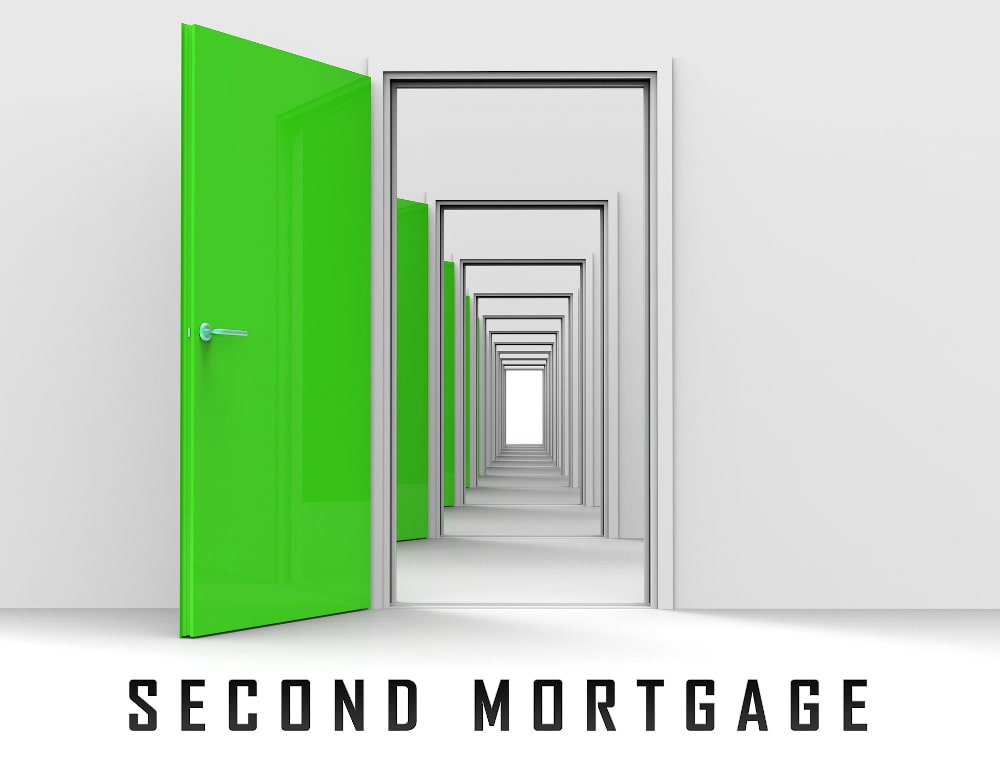Is a second mortgage the same as a home equity loan?

Both home equity loans and mortgages serve one single purpose – allow homeowners to get money. They both involve your home as collateral. This means giving the lender the right to seize your property if you fail to keep up with and make your monthly mortgage payments on time.
This is the main common point between the two loans, however, they also differ in some departments.
In this article, we’ll look at some of the ways that a second mortgage is the same as a home equity loan, and in which ways it is different.
What is a Home Equity Loan?
Loans taken against your home equity are called home equity loans.
Home equity refers to the difference between the amount you owe to your lender and the value of your property.
For example, if the value of your house is $300,000 and you owe $100,000 on your mortgage, then your home equity is $200,000.
You can increase your home equity by paying down your mortgage and increasing the value of your home (naturally or through repairs and changes).
Home equity loans come in different forms including second mortgages, home equity line of credit (HELOC), third mortgages and refinancing a 1st mortgage and increasing it with an equity takeout.
What is a Second Mortgage?
A second mortgage is a type of home equity loan that comes in 2nd position behind the first mortgage. You can typically borrow up to 80 percent of the appraised value of your property, minus the remaining balance from your first mortgage, although there are some private lenders who will give a second mortgage up to 80%.
This is one of the quickest and easiest ways to be able to take out equity from your home. We can have a borrower approved in as little as a few hours and we can have their second mortgage funded in as little as 48 hours under certain conditions.
With a second mortgage, you will have to continue making your regular payments on your first mortgage, while also making payments towards your second mortgage. It’s important to note that second mortgage payments usually consist of interest-only payments, and do not typically pay down any portion of the principal balance. In case you default, your property will be sold and your first lender would be paid first with your second mortgage lender taking back their investment and fees from anything that may remain after the first mortgage lender recoups their money.
Second Mortgage and Interest Rates
The second mortgage is usually more expensive than the first mortgage due to higher interest rates and fees that are charged to the borrower.
The rates are higher with second mortgages because the second mortgage lender has less security than the first mortgage lender since their loan comes in second priority. This means that if the borrower stops paying their mortgage to the first mortgage lender and the property is put into power of sale, the first lender pulls out their money first.
The second lender is left to recoup their investment second provided that there are enough proceeds remaining after the sale of the property is processed and closed.
As a result, the interest rates can start as low as 6.99% on a second mortgage and increase depending on a variety of factors (this is the starting rate as of the day this article was written and is subject to change at any time).
In addition to the interest rate, there are additional lender and brokerage fees that come along with a second mortgage. These fees also depend on a number of factors and can start as low as 1% for each of the two fees and be as high as 5% or even more.
Where Can I Find a Lender for a Second Mortgage?
Private mortgage lenders are primarily used for second mortgages.
Since private mortgage lenders are not restrained by the same rules and regulations that banks are, the process tends to be much quicker and requires less documentation from the borrower than the process of refinancing their current 1st mortgage or applying for a HELOC through an institutional lender.
Who Is a Second Mortgage Ideal For?
A second mortgage can be ideal in the following situations:
Consolidating Debt
A second mortgage is ideal for consolidating debt using the equity a borrower has built up in their home. It can be especially helpful when consolidating higher interest debts that are typically associated with credit card debt, department store debt, personal unsecured lines of credit, student loans, and more.
Homeowners with a Bad Credit or Income
Second mortgages are ideal for homeowners who have bad credit, earn little traditionally-provable income, or for people who are self employed and have unconventional ways of declaring their income.
This is due to the fact that most 2nd mortgage lenders are primarily equity-based lenders and place most of their lending decisions on the actual property itself. Factors such as the loan-to-value, the condition of the home, the location of the property, and the marketability of the home bears a far greater impact on the lender’s underwriting process and approval decision than the borrower's credit or income situation, though it is critical for a mortgage broker or agent to verify every borrower's income and ensure that the new mortgage will not likely cause them to default on their mortgage obligations.
Homeowners Interested in Saving Money
Despite the higher interest rate and fees, since a second mortgage typically requires the borrower to make interest-only payments, it can help save hundreds and even thousands of dollars a month to borrowers who are looking to consolidate multiple higher interest debts into one smaller monthly payment. This in turn can alleviate many problems that arise from cash flow challenges due to having most of your income going towards making minimum payments on high-interest debt and overdue bills.
A large number of people choose a second mortgage to pay off high-interest consumer debt. The average credit card interest in many parts of North America is 15 percent or more. Now, if your balance on your credit card is $30,000, and you are expected to make a minimum monthly payment of $600 (3% generally required), it will cost you $4,500 in interest payments in the first year.
Using the extra cash flow savings from a second mortgage, you can put some or all of the surplus cash towards paying off the principal of the loan at a much faster pace than if they were to continue paying down the original individual debt obligations.
Second Mortgage Versus Home Equity Loans: Conclusion
A second mortgage is a type of home equity loan and the two terms are even used interchangeably.
According to this Business Insider page , there were more than 1.91m Canadians with HELOCs in 2017, and even more with a second mortgage in the country. It’s safe to assume that this number has grown since then, as is the case with most household debts. The benefits of a second mortgage are obvious. It’s a tool that should be used for a short period of time and in a clever manner to help with cash flow, alleviating debt, paying off certain debts faster, renovations, and other strategic financial decisions.





